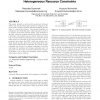Free Online Productivity Tools
i2Speak
i2Symbol
i2OCR
iTex2Img
iWeb2Print
iWeb2Shot
i2Type
iPdf2Split
iPdf2Merge
i2Bopomofo
i2Arabic
i2Style
i2Image
i2PDF
iLatex2Rtf
Sci2ools
115
click to vote
DAC
2003
ACM
2003
ACM
Partial task assignment of task graphs under heterogeneous resource constraints
This paper presents a novel partial assignment technique (PAT) that decides which tasks should be assigned to the same resource without explicitly defining assignment of these tasks to a particular resource. Our method simplifies the assignment and scheduling steps while imposing a small or no penalty on the final solution quality. This technique is specially suited for problems which have different resources constraints. Our method does not cluster tasks into a new task, as typical clustering techniques do, but specifies which tasks need to be executed on the same processor. Our experiments have shown that PAT, which may produce nonlinear groups of tasks, gives better results than linear clustering when multi-resource constraints are present. Linear clustering was proved to be optimal comparing to all other clusterings for problems with timing constraints only. In this paper, we show that, if used for multi-resource synthesis problem, as it is often used nowadays, linear clustering w...
DAC 2003 | Design Automation | Linear Clustering | Partial Assignment Technique | Typical Clustering Techniques |
Related Content
| Added | 13 Nov 2009 |
| Updated | 13 Nov 2009 |
| Type | Conference |
| Year | 2003 |
| Where | DAC |
| Authors | Radoslaw Szymanek, Krzysztof Kuchcinski |
Comments (0)

